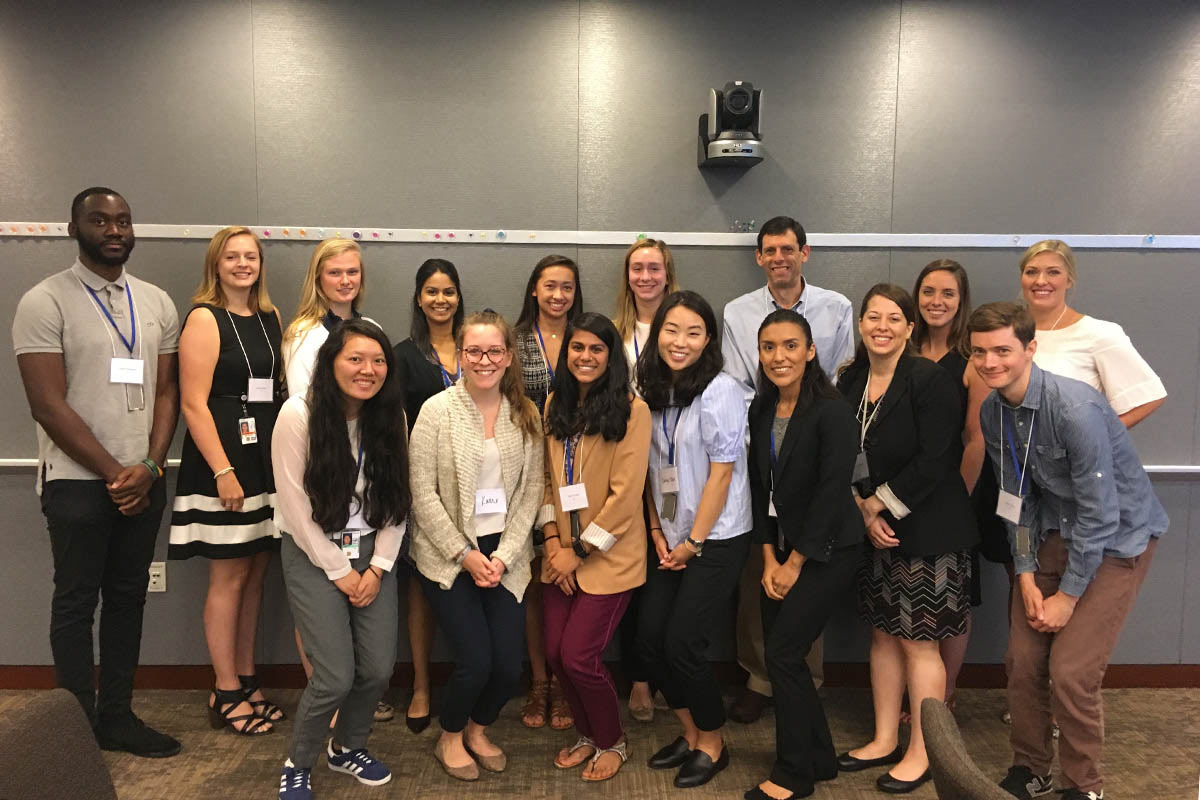
A few words from DCCPS Training Director Rick Moser

It’s an exciting time in cancer research, given the amount of attention and associated funding currently being put into the area. Programs like the Precision Medicine Initiative, which includes the NIH-funded All of Us program, spur research and create optimism about making inroads in reducing cancer morbidity and mortality. These initiatives address multiple determinants of cancer prevention, diagnosis, and treatment, including genetic, biological, and, most important for our work here, behavioral factors, such as lifestyle and environmental effects. Given that approximately 50% of all cancer cases could be prevented by eliminating risky behavioral factors like smoking, sedentary lifestyles, and poor nutrition[1], it’s more important than ever to train the next generation of cancer researchers to have expertise in behavioral research.
There are many benefits to joining the Behavioral Research Program (BRP) as a fellow. Our fellows are mentored by experts in cancer research; meet and network with other NCI and NIH fellows and staff; attend and present at scientific conferences, workshops, and symposia; learn about the grants process; and receive training in their areas of cancer-related behavioral interest. Fellows perform research, complete literature reviews and data analyses, give presentations, write manuscripts, and contribute to applied communication and project-management efforts, among other activities. Our program’s interest areas include health communication; cancer-related behaviors such as tobacco use, physical activity, diet/nutrition, sun safety, and alcohol use; and understanding the role of basic psychological processes such as affect and cognition on cancer control.
BRP offers training fellowship opportunities for people at various education levels. Although most are only available to U.S. citizens, there are some limited opportunities for international post-docs and graduate students.
Many BRP fellows are part of the Cancer Research Training Award (CRTA) mechanism. These full-time fellows are usually here for at least one year and may be able to extend up to a maximum of five years (for post-docs; two for bachelor’s and master’s level). CRTA opportunities open on a rolling basis and can be found on the BRP Career and Training page when available.
Those interested in summer internships should sign up through the NIH website (and soon — the 2019 application process is expected to be available in early December). Once registered, applicants can reach out to BRP researchers to inquire about placements.
We also hire fellows from the NCI Communications Fellowship (NCF, formerly known as the Health Communications Internship Program, HCIP), which provides training in health communications or science writing for recent graduate students, and from the Cancer Prevention Fellowship Program (CPFP) , which is open to those who have obtained a doctoral-level degree and provides 3-4 years of mentored research with a focus on cancer prevention. Outside NCI, BRP also welcomes people from the Presidential Management Fellows Program (PMF), an opportunity for recent advanced-degree graduates and current graduate students that offers two-year internships at federal agencies and formal training on leadership, management, and more. NCF applications open in January, CPFP applications in May, and PMF applications in the fall. Read on for more about each program.
Our program at NCI offers various opportunities to be trained in behavioral research and to work with experts in this area. Next time you’re looking for a new way to grow your career, or you have a colleague or mentee who is, please keep us in mind.
Rick Moser
Featured Fellows
Jamie Cordova, M.P.H.

Cancer Research Training Award fellow, Tobacco Control Research Branch
A native of the Boston area, Jamie Cordova received her Master of Public Health (M.P.H.) in epidemiology and biostatistics from Tufts University School of Medicine. She joined NCI through the Health Communications Internship Program, an opportunity she learned about through her academic advisor.
Now a second-year fellow, Jamie splits her time between two major projects. One focuses on analyzing national survey data for tobacco control research projects. The other centers on facilitating the efforts of grantees involved in the SCALE Collaboration, which aims to share data and methods from nine funded research projects to enable cross-project research on smoking cessation interventions in the setting of low-dose computed tomography (LDCT) lung cancer screening.
Jamie knew she wanted to pursue epidemiology after taking an introductory college course and working with her teaching assistant, a doctoral environmental epidemiology student, on research projects that continued throughout Jamie’s undergraduate career. An unexpected invitation to attend a series of lectures by public health luminaries at the Harvard T.H. Chan School of Public Health cemented her career path.
At NCI, Jamie has worked with two formal mentors, Carolyn Reyes-Guzman and Stephanie Land, who give her the opportunity to develop and exercise very different skills, from data analysis to manuscript writing to project management. It’s the multitude of research projects and the welcoming attitude among program staff that have been the highlight of Jamie’s fellowship experience. “Everyone is so kind and willing to mentor fellows with less experience,” Jamie said. “I appreciate them giving back to young scientists who are at the beginning of their careers.”
Jamie aspires to work as a state- or federal-level epidemiologist, either in tobacco control or maternal and child health. If she stays in the cancer space, she would like to address the tobacco industry’s evolving tactics to make their products more appealing to a new generation of smokers. “Young people have gotten the message that smoking cigarettes is bad, but they don’t have the same negative perceptions of e-cigarettes,” Jamie said.
She added, “E-cigarettes and other vaping devices present a host of new challenges and research questions. For instance, we’re still learning about the short- and long-term health effects of e-cigarettes and their relationship with combustible products. There’s still much work to be done to understand the current landscape of tobacco-related suffering.”
Melinda (Mindy) Krakow, Ph.D., M.P.H., M.A.

Cancer Prevention Fellow, Health Communication and Informatics Research Branch
As a graduate student, Mindy Krakow “butchered” an analysis of data from the BRP-developed Health Information National Trends Survey (HINTS). “We were just two grad students taking some of our first stats classes, and we had to find a data set to play with, and we didn’t really know what survey weighting was, which was a big critique of our analysis,” she remembered, laughing.
Today, as the fellows liaison to the HINTS management team, she connects fellows with resources to do their own HINTS analyses, contributes to the survey’s development, uses it in her own research, and once co-hosted a seminar about it at the International Communication Association conference in Prague — and she answers students’ questions about it.
The fourth-year fellow also works on eye-tracking research that looks at how cancer research is disseminated to the public and how they engage with it, and she’s chair of the data committee for L.A.U.N.C.H., an NCI-FCC collaboration that’s examining the role connected health solutions can play in coordinating better care for rural cancer patients.
Mindy started working on cancer communication and “really developed a passion” for it while completing in her Ph.D. in communication at the University of Utah. Around the same time, several close family members and friends died of cancer, and so “I was very personally motivated to figure out where I could contribute to trying to help families and patients undergoing cancer experiences,” she said.
Mindy said connecting with mentors she “really clicked with” was key in the development of her interest in her field, both as a graduate student and here at NCI, where she’s been mentored by Bradford Hesse and April Oh. “I think when I see the passion of the mentors and the leadership around me, that really sustains a lot of my enthusiasm,” she said.
The California native said her time with NCI has taught her about the “inner workings of the grants process” and how to write grants better.
Mindy said she’d like to continue to build a career in federal service in public health, where she thinks there are “some really exciting opportunities and questions” about behavioral genomics and about technology related to health communication and health care delivery. “It would be great to get to answer some of those questions at a federal level.”
Melissa Trevino, Ph.D., M.A.

CRTA fellow, Basic Biobehavioral and Psychological Sciences Research Branch
Melissa Trevino never imagined that so much of her research would involve advocacy. Since starting her doctoral program at the University of Houston in Texas, she has been pitching her research ideas to people who will listen.
Melissa is a cognitive psychologist who applies basic visual perception and cognition principles to cancer detection and survivorship research. Specifically, she is studying the processes that underlie how health providers like radiologists see, perceive, remember, learn, and judge medical images to detect and diagnose cancer. With this fundamental understanding, her research may be able to improve accuracy and reduce errors in cancer screening.
Melissa’s path as a cognitive psychologist began in a behavioral neuroscience lab where she studied rodent models of pediatric cancer and radiation sequelae. That research program led her to study brain behavior and how to apply visual cognition paradigms to cancer research. With the help of her mentors, Drs. Bruno Breitmeyer and Jack Fletcher, she was able to advocate the importance of her research to department heads at Texas Children’s Hospital to investigate the relationship between working memory and attention among survivors of pediatric cancer.
At NCI, Melissa is working with her mentor, Todd Horowitz, on innovative approaches to jumpstart interest in perceptual and cognitive research in cancer image perception. A significant barrier that researchers typically encounter is the difficulty and expense of recruiting and studying radiologists and other health professionals. So the researchers are meeting them where they are —the Radiological Society of North America conference, which draws 25,000 attendees every year. For the past two years, Melissa and Todd have worked with the meeting organizers to set up the NCI Perception Laboratory, a shared “pop-up” lab where investigators can recruit and test radiology observers for concurrent experiments. Since the laboratory’s inception, twenty laboratories have participated, collectively running 457 participants through 41 experiments. The team is now exploring how to apply this approach to studies involving surgeons and pathologists.
Melissa recently received the Collaborative Research Award for Fellows in Training (CRAFT). Her yearlong project involves recruiting practicing radiologists, radiologists-in-training, and novices to measure their eye movements and behaviors as they quickly view images and investigate the differences between them.
Kara Wiseman, M.P.H., Ph.D.

Cancer Prevention Fellow, Tobacco Control Research Branch
At the beginning, Kara Wiseman’s population health and cancer prevention research career was shaped by colorectal cancer screening: She worked with an advisor who focused on it while she completed her M.P.H. and Ph.D. in epidemiology at Virginia Commonwealth University.
But during her Ph.D. program, she realized she was interested in something else:
“What I got more excited about day to day was actually the study design and implementation,” she said. “So that’s why when I came here to NCI, I was looking to expand beyond cancer screening and find ways to apply my epi methods training to other behaviors.”
Now, the Virginia native works on mobile and digital health interventions for smoking cessation through BRP’s Smokefree.gov initiative, which offers a perfect opportunity to develop new research ideas, and to do research in real time.
“Since part of my interest is understanding how interventions work, it was a real benefit to be able to work on a program that is a living, breathing thing that you can make changes to or look at different types of program data while I was here,” she said.
She’s conducted different types of projects, most memorably a factorial study, “…a method…I had learned about in grad school and thought was really useful, but hadn’t gotten to use,” she said.
Kara has also assessed adolescent and parental dyadic associations using the Family Life, Activity, Sun, Health, and Eating (FLASHE) study data set, and analyzed HINTS data related to e-cigarettes and to people’s awareness of alcohol as a cancer risk factor.
Kara was also drawn to the opportunity the Cancer Prevention Fellowship Program offered to be part of a larger network of fellows. Her cohort offers regular chances to socialize, network, practice public speaking, and more. She served as co-chair of the symposium that second-year CPFs plan, which led to “skills I learned that I’ve now been able to apply in other contexts, including just managing my research projects and communicating with people in general,” she said.
She’s been impressed by how many chances she’s had to “be part of public health at a national level,” like helping to promote Smokefree.gov’s Spanish-language resources in a CDC-run webinar and attending working-group meetings with larger federal public health groups. She even had an opportunity to work at Cancer Research UK (CRUK) in London for two months as the first scholar of the Cancer Prevention and Fellowship Exchange program, a collaboration between NCI and CRUK to build a scientific infrastructure that promotes the exchange of ideas and advances cancer prevention and control efforts.
Now in her fourth and final year as a CPF, Kara hopes to move into a tenure-track faculty position where she’d like to continue working in mobile health and evaluating and developing digital interventions for smoking cessation, using some of her Smokefree.gov work to “set the stage” for her career.
Recent fellow-led publications and resources
“Don’t know” survey response option brings mixed results
Health Communication and Informatics Research Branch CRTA fellow Emily Peterson led a recent paper on the development and performance of tobacco product and regulation perception items for two tobacco-focused cycles of the Health Information National Trends Survey (HINTS). The team reported that a “don’t know” response option is useful for assessing perceptions of emerging tobacco products, but also presents analytic challenges.
Reference: Peterson, E.B., Portnoy, D.B., Blake, K., Willis, G., Trundle, K., Caporaso, A., Maitland, A., Kaufman, A. Item development and performance of tobacco product and regulation perception items for the Health Information National Trends Survey. Nicotine Tob Res (2018).
Early-life adversity brings brain changes linked to risky health behaviors
Korrina Duffy, a CRTA fellow in the Basic Biobehavioral and Psychological Sciences Branch, and collaborators made the case that early-life adversity influences brain development in ways that increase the likelihood of engaging in health-risk behaviors. It alters neural circuitry behind cognitive control and emotional processing, they wrote, and those neural changes affect emotional reactivity, reward responsivity, emotion regulation, and delay discounting, leading to an increased risk of smoking cigarettes, drinking alcohol, and eating high-fat, high-sugar foods.
Reference: Duffy, K.A., McLaughlin, K.A., Green, P.A. Early life adversity and health-risk behaviors: proposed psychological and neural mechanisms. Ann N Y Acad Sci (2018).
Appalachians may regard behavioral prevention differently
Recent Health Behaviors Research Branch CRTA fellows Elise Rice and Minal Patel and collaborators used Health Information National Trends Survey (2011-2014) data to explore health beliefs and obesity in Appalachia. They found that compared with non-Appalachians, Appalachians had higher self-reported body mass and were less likely to believe lifestyle factors related to obesity, suggesting that they may be less confident in the behaviors’ effectiveness in reducing obesity risk.
Reference: Rice, E.L., Patel, M., Serrano, K.J., Thai, C.L., Blake, K.D., Vanderpool, R.C. Beliefs About Behavioral Determinants of Obesity in Appalachia, 2011-2014. Public Health Rep (2018).
Smokefree Women tobacco cessation website gets redesign
Annie Beach, a CRTA fellow in the Tobacco Control Research Branch, was among the leaders of a recently-launched refresh of Smokefree Women (SFW), a public-facing tobacco cessation website designed to address the unique challenges that some women face as they quit smoking cigarettes. It includes audience-specific information about common issues for female smokers, such as weight gain, support while quitting, relationship changes, and quitting before, during, or after pregnancy.
Fellows in the news
“Don’t Fry Day” campaign needs wider reach
Reuters ![]() interviewed recent Health Behaviors Research Branch fellow Jennifer Nguyen about her analysis of the National Council on Skin Cancer Prevention’s 2017 “Don’t Fry Day” Twitter campaign, which was meant to encourage sun safety awareness and proper sun protection behaviors. Her paper “Analysis of the Twitter “Don’t Fry Day” Campaign” was published in JAMA Dermatology in August. It said that while the campaign had a large reach, organizers needed to engage media organizations and people with larger social media followings to make sure it got to a wider audience.
interviewed recent Health Behaviors Research Branch fellow Jennifer Nguyen about her analysis of the National Council on Skin Cancer Prevention’s 2017 “Don’t Fry Day” Twitter campaign, which was meant to encourage sun safety awareness and proper sun protection behaviors. Her paper “Analysis of the Twitter “Don’t Fry Day” Campaign” was published in JAMA Dermatology in August. It said that while the campaign had a large reach, organizers needed to engage media organizations and people with larger social media followings to make sure it got to a wider audience.
Sunscreen not enough to protect from sunburn
Reuters ![]() interviewed recent Health Behaviors Research Branch fellow Kasey Morris about her analysis of how various sun-protective behaviors affect sunburn risk, which was done with an innovative decision-tree-model approach. “The most surprising and counterintuitive finding was that regular sunscreen use, in the absence of other protective behaviors, was associated with the highest likelihood of sunburn,” Morris told Reuters. Her paper was published in JAMA Dermatology in August and titled “Decision Tree Model vs. Traditional Measures to Identify Patterns of Sun-Protective Behaviors and Sun Sensitivity Associated with Sunburn.”
interviewed recent Health Behaviors Research Branch fellow Kasey Morris about her analysis of how various sun-protective behaviors affect sunburn risk, which was done with an innovative decision-tree-model approach. “The most surprising and counterintuitive finding was that regular sunscreen use, in the absence of other protective behaviors, was associated with the highest likelihood of sunburn,” Morris told Reuters. Her paper was published in JAMA Dermatology in August and titled “Decision Tree Model vs. Traditional Measures to Identify Patterns of Sun-Protective Behaviors and Sun Sensitivity Associated with Sunburn.”
Collaboration required to tackle ‘chemobrain’
Basic Biobehavioral and Psychological Sciences Branch fellow Melissa Trevino was among the BRP researchers who issued an appeal for collaboration between neuroscience and clinical neuropsychology to better understand and address cancer-related cognitive impairment, sometimes referred to as “chemobrain.” Their paper, “A Call for a Neuroscience Approach to Cancer-Related Cognitive Impairment,” was published in Trends in Neurosciences in August, and it went on to receive coverage from The Los Angeles Times ![]() and Medical Xpress
and Medical Xpress ![]() .
.
Research review of cascade screening for hereditary conditions
Recent Cancer Prevention Fellow Megan Roberts was a panel presenter at a Health Affairs briefing on precision medicine at the National Press Club in May 2018. She presented findings from a scoping review of the current literature on best practices, barriers and facilitators, and future research needs related to cascade screening for hereditary conditions. Cascade screening is a systematic approach to screening relatives of individuals identified with hereditary conditions such as hereditary breast and ovarian cancer and Lynch syndrome. This screening technique can improve population health by connecting relatives to risk-reduction strategies and can improve cost-effectiveness of evidence-based genetic testing.
Awards and Recognitions
Camella Rising, a Cancer Research Training Award fellow in the Health Communication and Informatics Research Branch, was awarded the 2018 Outstanding Dissertation Award in the National Communication Association’s Communication and Aging Division (CAD). Her dissertation was titled, “Fathers’ and Sons’ Communication Behaviors in Response to Prostate Cancer and Familial Risk: Motivations, Challenges, and Approaches in the PSA Era.”
Current Opportunities
In the Behavioral Research Program
Cancer Research Training Award fellowship, Health Behaviors Research Branch
The program invites applications from qualified candidates with a Ph.D. or master’s degree for a full-time fellowship position in innovative, interdisciplinary health behavior research. Areas of research include a broad range of approaches used to address cancer-related behaviors (diet and nutrition, sleep, alcohol, etc.) and associated factors (genetics, affect, family, environment, etc.) to advance behavioral and social science for cancer prevention and control. Read the position description »
Cancer Research Training Award fellowship, Health Behaviors Research Branch
The program invites applications from qualified candidates with a Ph.D. or equivalent degree for a fellowship position in quantitative methods. (A candidate with a master’s degree with advanced training or certification in quantitative methods may also be considered.) The fellow will manage the Classification of Laws Associated with School Students (CLASS) project and conduct behavioral research related to health laws, working independently and in teams to analyze data, present findings at scientific conferences, and publish results. Position coming soon.
Cancer Research Training Award fellowship, Behavioral Research Program
The program invites applications from postdoctoral candidates with interest and expertise in dyadic relationships and social processes to help lead the development of a survey that seeks to evaluate social, relational, psychological, environmental, and sociodemographic factors associated with cancer risk and preventive behaviors among romantic, co-habitating dyads, among other work. Read the position description »
Cancer Research Training Award fellowship, Office of the Associate Director
The program invites applications from qualified candidates with a master’s degree or equivalent to work on communication projects to support four program branches in the areas of cancer-related health behaviors; biopsychosocial processes of cancer-related behaviors; tobacco control; and health communication research and decision science in cancer control. Read the position description »
In the Division of Cancer Control and Population Sciences
Cancer Research Training Award fellowship, Clinical and Translational Epidemiology, Epidemiology and Genomics Research Program
Cancer Research Training Award fellowship, Biomedical and Health Informatics for Cancer Surveillance, Surveillance Research Program
Cancer Research Training Award fellowship, Cancer Surveillance Data Quality, Surveillance Research Program
Other Career and Training Opportunities and Contacts
NCI Communications Fellowship (NCF, formerly known as the Health Communications Internship Program, HCIP)
Open to recent advanced-degree graduates and current graduate students who have communications experience/education, this program offers one-year communications fellowships in various NCI offices. The 2019 application cycle opens in January 2019. Learn more about the program »
Cancer Prevention Fellowship Program (CPFP)
This program includes support for up to four years and the opportunity to earn an MPH sponsored by NCI. It is open to people who have a Ph.D, M.D., or other doctoral degree in a related field, or who will have completed one by the start of the program. Applicants must have less than five years of relevant postdoctoral experience. The 2019 application cycle opens May 1, 2019. Learn more about the program »
The Cancer Prevention Fellowship Program also offers two free Summer Curriculum in Cancer Prevention Courses: the four-week Principles and Practice of Cancer Prevention and Control course (July 8 - August 2, 2019) and the one-week Molecular Prevention course (August 5 - 9, 2019). Both are open to physicians, scientists, other health professionals, fellows, and students who have an interest in cancer prevention and control. Applications are open now until February 1, 2019, for domestic and international applicants. Learn more and apply »
NIH Office of Intramural Training and Education (OITE)
This office oversees all NIH training. It provides programs and services for current trainees and resources and information for prospective trainees. The website has information about NIH training programs and current training opportunities across the many NIH institutes and centers. Learn more about the office »
Presidential Management Fellows Program (PMF)
Open to recent advanced-degree graduates and current graduate students, this program offers two-year paid internships at federal agencies and 160 hours of formal interactive training on leadership, management, and other topics. Applications open annually in the fall; the 2019 cycle closed Oct. 22. Learn more about the program »

Follow the BRP Twitter account, @NCIBehaviors ![]() , to stay in the loop on our latest publications, resources, career and training opportunities, and much more.
, to stay in the loop on our latest publications, resources, career and training opportunities, and much more.
[1]Dart, H., Wolin, K. Y., Colditz, G. A. Commentary: eight ways to prevent cancer: a framework for effective prevention messages for the public. Cancer Causes Control (2012).
Visit the archive page to view other Scientific News from the Behavioral Research Program newsletters.

